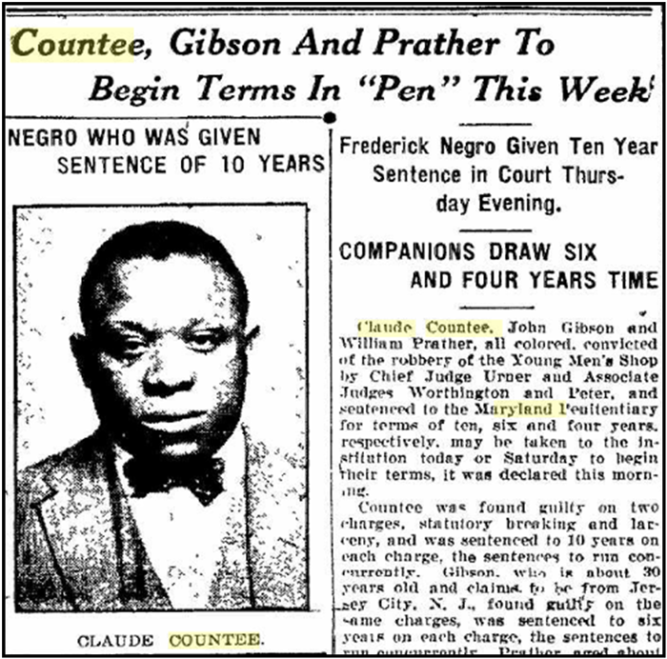Claude Countee
Alcohol (specifically ethanol, the good stuff in spirits) is a fairly simple carbon based molecule, but ever since civilization started producing beverages loaded with it, there have been controversies about its use.
As Americans, the most dramatic time period related to alcohol was the 13 year period where the sale and use of recreational alcohol was banned by the Eighteenth Amendment and the Volstead Act. It’s hard to imagine all the taps at your local bar going dry over night, but that’s exactly what happened at midnight on January 17, 1920 because of these actions by the federal government.
As a lifelong history nerd, I can’t help but look at those who came before us when thinking about the business. Prohibition made profound changes to peoples’ lives, including many folks here in downtown Frederick. It’s with this in mind that I write our inaugural blog post about one of our product’s namesake, Claude “Diamond Tooth” Countee.
Claude Countee, known as “Diamond Tooth” because of an insert in one of his canines, was born on March 22, 1890 in Frederick, MD. It’s hard to tell from the records we’ve found so far, but it looks like Claude might have grown up on Degrange Street between South and Patrick Streets. From local papers it’s clear that Claude Countee had run-ins with the law as early as 1915.
Photo: Cover page of the May 23, 1924 edition of the Frederick News. Please pardon the 1920’s parlance. If we could go back in time and enlighten people, we would. (courtesy Historical Society of Frederick County)
Like many others who found themselves at odds with law enforcement, Countee took the enacting of Prohibition in 1920 as a business opportunity. Prohibition-era Frederick was rife with illicit activity. Illegal stills churned out spirits on farms across the county, and in the woods up on Catoctin Mountain. There was plenty of local demand for the booze, but the main drivers of the moonshiners and bootleggers were the metropolitan areas of Washington and Baltimore.
Countee was arrested in the fall of 1922 in a county-wide liquor sting operation led by the Frederick County Sheriff’s Department along with many others, including a Mr. Lindsay Stunkle (more on him in a later post), proprietor of the Ideal Pool Parlor on South Market Street. The Ideal Pool Parlor acted as a base for local bootleggers and Claude would have been a familiar face to its patrons.
The Frederick News Post labeled him a “big handler” in the local bootlegging circuit, which included a network of stills and underground trade networks stretching from Brunswick to Thurmont, and Braddock Heights to Mt. Airy.
(Photo: courtesy Historical Society of Frederick County)
After paying some fines and spending some time in jail, Countee turned to robbing clothing stores as his new vocation. In 1924 Countee was convicted of stealing $3,000 worth of merchandise (almost $42,000 today) from a downtown Frederick clothing store and was sentenced to ten years. He was released early on parole, but was again arrested in connection with a robbery of B. Rosenour’s clothing store on North Market Street in 1930.
Photo: The Rosenour Building today. Next time you’re in the Tasting Room having a cocktail think about Claude and his associates on the job there in 1930.
In 1931, Countee and some associates escaped from prison after sawing through cell bars. The jailbreak was a local media sensation that was still being mentioned in the Frederick News Post as late as 1960. Countee was not located until 1935, when he was arrested in Chicago operating under the alias of Arthur Brooks. He was extradited to Maryland, where he was held in the Maryland State Penitentiary in Baltimore for a 16 year sentence. The last mention of Countee in the local Frederick papers was in 1957, when word reached Frederick that Diamond Tooth had been arrested for crimes committed in Boston. By that time, Countee was 67 years old, and it’s quite possible he died in jail.
Like many other new distilleries, we’re leaning heavy on our white/unaged spirits to keep us going until we start emptying barrels. White whiskies bear a big resemblance to the sort of thing you could expect to buy off a bootlegger in 1920’s Frederick. That’s why you’ll see many of our white products named after folks like Claude Countee. Our Claunde Countee Corn Whiskey is enjoyed straight from the still with no barrel aging. You’ll notice a hint of smoke when sipping it because the corn (which makes up 80% of the mash bill) was smoked by our farmer Rusty before being cracked and mashed with malted barley. I like to think of it as a diamond in the rough as far as corn whiskies go, not unlike the diamond you’d see if Claude Countee smiled as he sold you some Frederick County moonshine.
There are so many gems and vivid accounts of Claude’s exploits that I expect to be writing about him again soon. If you have questions, comments, rants or anything at all you’d like to say, the comment section is below.
Stay tuned and always remember to ward off ordinary.


